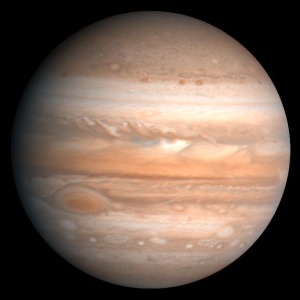 One of the names of Jupiter in the ancient Sanskrit texts is Guru. This name is fitting for Jupiter as he is the planet that is said to be the most wise and proficient in all branches of knowledge, and that is what we think of as a Guru. Someone who can teach us how to do what we want to do. But what does the word Guru really mean? It is normally defined as the person who removes the darkness from you and puts you into the light. This is because the syllable “gu” means darkness or ignorance, and the syllable “ru” means destroyer, so the one that destroys your darkness is the common definition. But when you look up the word Guru as a single word in the sanskrit dictionary, it comes out different. It means “heavy“. And of course like all Sanskrit words it has many layers of meaning. A Guru is someone who is “heavier” in knowledge and experience of something than you are. In this way anyone can be a guru to anyone else. For example, I may have more experience and knowledge of Astrology than you, which would make me a guru to you for Astrology, but you may have more knowledge than me of Ayurveda, or in woodworking. This would make you a Guru to me for Ayurveda, or woodworking because you are heavier in that wisdom. This way of understanding the word also reveals that wisdom and knowledge are the true measure of the weight and value of a person on this Earth. In the same way Jupiter if strongly influencing the chart, makes one a valuable person to society.
One of the names of Jupiter in the ancient Sanskrit texts is Guru. This name is fitting for Jupiter as he is the planet that is said to be the most wise and proficient in all branches of knowledge, and that is what we think of as a Guru. Someone who can teach us how to do what we want to do. But what does the word Guru really mean? It is normally defined as the person who removes the darkness from you and puts you into the light. This is because the syllable “gu” means darkness or ignorance, and the syllable “ru” means destroyer, so the one that destroys your darkness is the common definition. But when you look up the word Guru as a single word in the sanskrit dictionary, it comes out different. It means “heavy“. And of course like all Sanskrit words it has many layers of meaning. A Guru is someone who is “heavier” in knowledge and experience of something than you are. In this way anyone can be a guru to anyone else. For example, I may have more experience and knowledge of Astrology than you, which would make me a guru to you for Astrology, but you may have more knowledge than me of Ayurveda, or in woodworking. This would make you a Guru to me for Ayurveda, or woodworking because you are heavier in that wisdom. This way of understanding the word also reveals that wisdom and knowledge are the true measure of the weight and value of a person on this Earth. In the same way Jupiter if strongly influencing the chart, makes one a valuable person to society.
It is also interesting that the ancient Seers of India gave the name of “heavy” to Jupiter, because Jupiter is the heaviest planet in the Solar System. Jupiter is even said to slightly affect the Sun’s movement which is not at all the case for the other planets. And of course this name is at least 2-3,000 years old if not much older, so there was no NASA information to rely upon when naming it. It is quite an amazing thing to think about how they may have known that this particular light in the night sky had the most mass of any of the others!